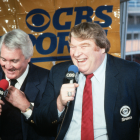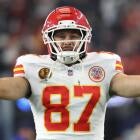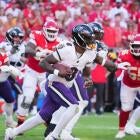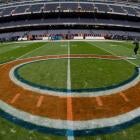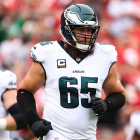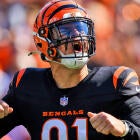Ranking all 20 Super Bowls on CBS, with Chiefs vs. Buccaneers ready to make it 21
From the Packers to the Patriots, CBS has covered some of the best Super Bowls of all-time

On January 15, 1967, TV crews from CBS and NBC ascended upon the Los Angeles Memorial Coliseum for Super Bowl I. For the first and last time, the Super Bowl was broadcast by two different networks. In fact, Super Bowl I is the only Super Bowl that had to re-do the second half opening kickoff, as one of the networks had not yet returned from commercial break.
This Sunday, CBS will have the Super Bowl for itself, as the network will be in Tampa to broadcast Super Bowl LV (you can watch it for free on the CBS Sports App). This will be a record 21st Super Bowl for CBS, with many of its previous Super Bowls going down as all-time classics. Speaking of classics, this year's Super Bowl has the makings of an all-time great game. The Chiefs, led by quarterback Patrick Mahomes, are trying to be the first team since the 2003-04 Patriots to repeat as champions. That Patriots team was led by Tom Brady, who on Sunday will try to win a record seventh Super Bowl ring. Kansas City is led by Andy Reid, who would become the 13th head coach to win multiple Super Bowls if the Chiefs win on Sunday. Reid's counterpart is Bruce Arians, who could become the oldest head coach to win the Super Bowl.
Before the ball is kicked off in Tampa, here's a ranking of the 20 previous Super Bowls aired by CBS. As you can see, CBS captured the action of the some of the best Super Bowls ever, games that helped make the Super Bowl the spectacle that it is today.
1. Super Bowl XXXVIII: Patriots 32, Panthers 29
A crazy, classic ending. Two years after Adam Vinatieri's game-winning field goal in Super Bowl XXXVI, the Patriots won a second ring following a game-winning kick by Vinatieri. This one, however, came at the end of a thrilling fourth quarter that included 37 points, five scores and the longest pass completion in Super Bowl history.
The Panthers trailed 21-10 early in the fourth quarter, but a 33-yard run by DeShaun Foster followed by an 85-yard completion from Jake Delhomme to Muhsin Muhammad gave the Panthers a 22-10 lead. The teams then traded touchdowns before the Panthers committed a costly error by kicking the ball out of bounds with 1:08 left. Brady took advantage of the short field. He completed three passes to Troy Brown before firing a 17-yard strike to Deion Branch. The completion to Branch set up Vinatieri's 41-yard boot with nine seconds left. The win capped off a 17-2 season for the Patriots, who ended the season on a 15-game winning streak. The streak would eventually reach 21 games the next season, a still-standing NFL record.
2. Super Bowl X: Steelers 21, Cowboys 17
For the first time ever, more than 80 million fans tuned in to what was the best of the first 10 Super Bowls. Trailing 10-7, Steelers linebacker Jack Lambert gave his team the momentum after throwing down Cowboys safety Cliff Harris after Harris taunted one of Lambert's teammates. An incensed Lambert led the Steelers with 14 tackles, while Pittsburgh's defense recorded seven sacks and three interceptions of Cowboys quarterback Roger Staubach. The third pick came on the game's final play, a Hail Mary in Pittsburgh's end zone.
As great as Pittsburgh's defense was, the star of the game was Lynn Swann, who caught four passes for 161 yards to earn MVP honors. Swann's 64-yard touchdown catch proved to be the game-winning score.
3. Super Bowl XLVII: Ravens 34, 49ers 31
This game is largely remembered for two things: a game coached between brothers John and Jim Harbaugh, and a power outage that paused the game for 34 minutes. And while those are memorable moments, it is seldom mentioned how good of a game this was. The Ravens, on the strength of two long touchdowns by Jacoby Jones, took a 28-6 lead before the power failure. When the lights came back on, so too did the 49ers, who scored 23 of the game's next 26 points. Colin Kapernick's 15-yard run made it a two-point game with 9:57 left.
Led by Joe Flacco, the Ravens never let the 49ers close the gap entirely. Following Kapernick's touchdown, Flacco led the Ravens on a 12-play scoring drive that increased Baltimore's lead to five points. Kapernick then moved the 49ers to the Ravens' 5-yard-line before misfiring on three consecutive passes. Flacco won MVP, while John Harbaugh won eternal bragging rights over his younger brother.
4. Super Bowl XIV: Steelers 31, Rams 19
This game was much closer than the final score would indicate. The Steelers, vying to win their fourth Super Bowl in six years, were trailing the underdog Rams by two points going into the final quarter. Franco Harris couldn't find running room, and Lynn Swann was out of the game with a concussion. Faced with a third-and-eight on his own 27, Terry Bradshaw went for broke, lobbing a deep post pass for John Stallworth. Bradshaw's gamble was rewarded by Stallworth, who raced to the end zone after catching the perfectly-thrown pass over his shoulder.
Rams backup quarterback Vince Ferragamo, who outplayed Bradshaw during the game's first three quarters, made a crucial mistake when he threw the ball to Jack Lambert on the ensuing possession. Several plays later, Bradshaw made the young quarterback pay, as he connected with Stallworth again for a 45-yard gain. Harris ended the drive with the game-clinching touchdown, as Pittsburgh put the finishing touches on its dynasty.
5. Super Bowl XLIV: Saints 31, Colts 17
It's fitting that New Orleans, a city known for its pomp and pageantry, won its first Super Bowl on the strength of its coach's bold decision. Trailing 10-6 at halftime, Sean Payton started the second half with the earliest onside kick attempt in Super Bowl history. The Saints recovered and took their first lead six plays later. The Saints lead 22-17 with 3:24 left when cornerback Tracy Porter's 74-yard pick-six off Peyton Manning sealed the win for the Saints. Drew Brees was named MVP after going 32-of-39 for 288 yards and two second half touchdown passes.
6. Super Bowl XVI: 49ers 26, Bengals 21
Though this game was played inside the comfort of Detroit's Silverdome, it was the first Super Bowl played in a cold weather city. It was also the first Super Bowl for the legendary broadcast duo of Pat Summerall and John Madden, as they called the first of the 49ers' four Super Bowl wins during the 1980s. The 49ers' first Super Bowl win was not easy. Ahead 20-0 at halftime, San Francisco needed a goal-line stand and clutch third-down completion from Montana to beat the gritty Bengals, led by league MVP Ken Anderson.
It was the first of eight Super Bowl broadcasts for the Summerall-Madden duo, whose broadcasts became the background of NFL Sundays for an entire generation of football fans.
"He was John Wayne and Walter Cronkite," Madden said of his longtime broadcast partner. "He could keep everything on an even keel. I'd be wandering off, and Pat could summarize it like three words. And I'd think, 'That's what I was trying to say.'"
7. Super Bowl I: Packers 35, Chiefs 10
Every great novel has a beginning, and the Super Bowl's first chapter unfolded in front of CBS cameras. In the first game between AFL and NFL teams, the AFL champion Chiefs put up a fight but were ultimately overwhelmed by Vince Lombardi's Packers. Ahead 14-10 at the start of the second half, Willie Wood's interception of Len Dawson opened the floodgates. The Packers scored three unanswered touchdowns, while Bart Starr's two touchdowns and 250 passing yards earned him MVP honors. The MVP could have gone to Max McGee, who caught seven passes for 138 yards and two touchdowns despite notoriously playing with a hangover.
8. Super Bowl XLI: Colts 29, Bears 17
While it mostly rained on his parade, Peyton Manning probably didn't mind after winning his only Super Bowl with the Colts. Devin Hester made Super Bowl history by returning the opening kickoff 92 yards for a score. The Bears stretched their lead to 14-6 before allowing four unanswered scores by the Colts, who received three field goals during that span by Vinatieri. With the Colts leading 22-17, Kelvin Hayden's pick-six of Beers quarterback Rex Grossman put the game on ice. Manning, whose 53-yard touchdown pass to Reggie Wayne got the Colts on the scoreboard, took home MVP honors. But the game's real MVP may have been Colts running backs Dominic Rhodes and Joseph Addai, who combined to amass 264 yards and a touchdown on 51 total touches.
This was the first Super Bowl play-by-play assignment for Jim Nantz, who on Sunday will broadcast his sixth Super Bowl.
9. Super Bowl 50: Broncos 24, Panthers 10
The Super Bowl's golden anniversary game is remembered for three things. It was the final game of Peyton Manning's illustrious career. Von Miller was named MVP following a dominant performance that included six tackles, 2.5 sacks and two forced forces. And Cam Newton, the league's MVP that season, received criticism after failing to jump on a loose ball that ultimately set up the Broncos' game-winning score.
One thing that has been forgotten is that this was actually a decent game that wasn't decided until C.J. Anderson's touchdown run with 3:22 left.
10. Super Bowl LIII: Patriots 13, Rams 3
In the lowest-scoring Super Bowl ever, both teams were stuck on three points midway through the fourth quarter. That's when the Patriots' trio of Tom Brady, Rob Gronkowski and Julian Edelman came through, as Gronkowski and Edelman combined to catch three passes for 59 yards. The catches set up Sony Michel's go-ahead touchdown run. Moments later, Stephon Gilmore's interception set up Stephen Gostkowski's game-clinching field goal.
11. Super Bowl II: Packers 33, Raiders 14
Similar to Super Bowl I, the Packers started slow before pouring it on in the second half. The Packers were again the recipient of a big second half interception, as Herb Adderley's 60-yard pick-six sealed Green Bay's second straight Super Bowl win. Two weeks earlier, the Packers clinched their third consecutive NFL title after beating the Cowboys in the fabled "Ice Bowl."
Super Bowl II was the final game on the Green Bay sideline for Lombardi, whose excellence during his time with the Packers led to the Super Bowl trophy being named in his honor.
12. Super Bowl XXI: Giants 39, Broncos 20
Playing their first Super Bowl, Bill Parcells' Giants actually trailed the Broncos at halftime, 10-9. But in the second half, Denver's defense simply had no answer for Phil Simms, who completed all 10 of his passes during the game's final 30 minutes. Simms, who threw two second half touchdown passes, won MVP honors after completing a Super Bowl record 88% of his passes. Simms out-dueled Broncos quarterback John Elway, who suffered the first of three Super Bowl defeats.
13. Super Bowl IV: Chiefs 23, Vikings 7
This game is unique for several reasons. It was the final game played between the AFL and NFL, as the two leagues merged later that year. The Chiefs' win forever evened the score between the two leagues in Super Bowl competition. And after falling short in Super Bowl I, Kansas City received a dominant defensive performance and an MVP showing from quarterback Len Dawson.
Super Bowl IV also featured Chiefs coach Hank Stram, who became the first coach to be "mic'd up" by NFL films. For over 50 years, Stram's colorful analysis of his team's win over the Vikings has been played and replayed during Super Bowl week.
14. Super Bowl Super Bowl XVIII: Raiders 38, Washington 9
The first Super Bowl played in Tampa, this was the second-biggest upset in Super Bowl history at that time. After beating the Dolphins in the previous Super Bowl, Washington was held completely in check by a Raiders team that had already won two Super Bowls over the previous seven years. The Raiders' defense, led by cornerbacks Mike Haynes and Lester Hayes, shut down Washington's talented receiving corps. The Los Angeles offense was led by game MVP Marcus Allen, who rushed for a then Super Bowl record 191 yards. His 74-yard touchdown run stood as the longest in Super Bowl history for 22 years.
15: Super Bowl XII: Cowboys 27, Broncos 10
The first Super Bowl played inside a dome did nothing to help ball security. The two teams combined to commit 10 turnovers, with the Broncos giving the ball away eight times. This was also the first Super Bowl where we had co-MVPs: Cowboys defensive linemen Randy White and Harvey Martin. Additionally, this was the first Super Bowl where we had a quarterback who had previously played in a Super Bowl face his former team in the big game. But despite switching teams, Morton threw four passes to the Cowboys, who held their former teammate to just 4-of-15 passing.
16: Super Bowl VIII: Dolphins 24, Vikings 7
This game exemplified the Dolphins' brilliance during their championship run. The Dolphins, on the strength of MVP Larry Csonka's 145 yards and two touchdowns, took a 24-0 lead en route to a 17-point win over the Vikings, who lost their second of four Super Bowls over an eight-year span. In victory, Brian Griese threw just seven passes, setting a still-standing Super Bowl record for fewest pass attempts in a game.
17: Super Bowl VI: Cowboys 24, Dolphins 3
After years of frustration, the Cowboys finally won the "Big One." Game MVP Roger Staubach threw touchdown passes to Bambi (Lance Alworth) and Iron Mike (Mike Ditka). Running backs Duane Thomas and Walt Garrison combined to rush for 169 yards and a touchdown on 33 carries. The Cowboys also had a field day defensively. Super Bowl V MVP Chuck Howley's interception of Griese set up the Cowboys' final touchdown. Earlier in the game, "Mr. Cowboy," Bob Lilly, tackled Griese for a 29-yard loss, the longest sack for loss in Super Bowl history.
18. Super Bowl XXVI: Washington 37, Bills 24
This one wasn't as close as the final score would indicate; Washington held a 34-10 lead before Jim Kelly led Buffalo on two late scoring drives. This game is largely remembered for two things: Following Mark Rypien's MVP performance, Joe Gibbs became the first coach to win three Super Bowls with three different quarterbacks. The other thing? Thurman Thomas misplaced his helmet before the opening kickoff, which caused him to miss the game's opening play.
19. Super Bowl XXIV: 49ers 55, Broncos 10
Yes, this game represents the largest blowout in Super Bowl history. Why is it not No. 20? Because, unless you were a Broncos fan, the execution of the 49ers' offense was truly a sight to behold. Joe Montana, playing in his fourth and final Super Bowl, was in complete control of San Francisco's offense. Before being pulled in the fourth quarter, Montana threw a then-Super Bowl record five touchdown passes.Three of those passes were caught by Jerry Rice, as the 49ers set a still-standing Super Bowl record for points scored.
20. Super Bowl XXXV: Ravens 34, Giants 7
This one was mostly a snooze fest sans a crazy 36-second sequence late in the third quarter. Ahead 10-0, Duane Starks' pick-six of Kerry Collins gave the Ravens a 17-0 lead. On the ensuing kickoff, Ron Dixon's 97-yard return cut the deficit back to 10 points. The Giants' reprieve did not last, however, as Jermaine Lewis ran the ensuing kickoff 84 yards for a score. The Ravens won their first title, while the Giants became the third team to not score an offensive point in the Super Bowl.
Want inside access into this unprecedented NFL season and more? Download and subscribe to All Things Covered with Patrick Peterson and Bryant McFadden for great interviews including Jerome Bettis' memories of the Steelers Super Bowl XL victory.









